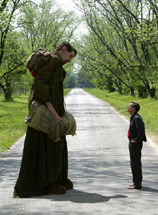Today’s LA Times has a lengthy article about Clive Cussler’s lawsuit over SAHARA. It’s a fun, gossipy read, partially because I’ve had beers with many of the people involved:
- Josh Oppenheimer and Thomas Dean Donnelly are classmates of mine,
- James V. Hart often works at the same Sundance labs,
- and the estimable Josh Friedman‘s anal canal gets a shout-out. (At this point, 47% of my readers click over to the story.)
For those who don’t have time to read the article, I’ll summarize the moral: be very careful when adapting the work of living authors. Particularly when they go on about how much they hate Hollywood.
Cussler had unprecedented and frankly unconscionable control over the adaptation. He bitched and bullied and couldn’t be placated. And if the resulting movie was less-than-stellar, well Mr. Cussler, three fingers are pointing back at you.
But on another level, I get it. Screenwriters are used to seeing their material altered, mangled and reinterpreted. Screenwriting is part of a process, and the craft can only support medium-sized egos.
The novelist, on the other hand, is God. And God doesn’t like to be told he’s a crotchety old jerk who’s been coasting on a mediocre franchise for years. I sympathize with Cussler’s dilemma: he wanted a big movie to bring new readers to his books, without any risk of the cinematic version replacing his literary one. Dirk Pitt has black hair, damnit! It says so here on page two! He wanted Hollywood on his terms.
Have fun with that lawsuit, Mr. Cussler.
My own experiences with adaptations have been more positive. (How couldn’t they be?)
For A WRINKLE IN TIME, Madeleine L’Engel functioned through a trusted producer, and while I had some significant disagreements over what plot points really needed to stay or go, at least I wasn’t arguing with the author. BIG FISH was a love fest from the start, with author Daniel Wallace so intrigued by the screenplay form that he became a screenwriter himself. And CHARLIE AND THE CHOCOLATE FACTORY was made with the blessing of — and little interference from — the Roald Dahl estate.
What lessons should an aspiring screenwriter take from the SAHARA debacle? For starters, remember that the unhappy stories get press simply because of the train-wreck factor. Most times, the author and screenwriter have a decent relationship — if they have one at all. A smart novelist remembers that the existence of a movie doesn’t change anything about the book sold at Barnes and Noble. And the smart screenwriter remembers to praise the author at the press junket.
 Matthew McGrory, who played Karl the Giant in Big Fish, died Tuesday in Los Angeles. He was 32.
Matthew McGrory, who played Karl the Giant in Big Fish, died Tuesday in Los Angeles. He was 32.